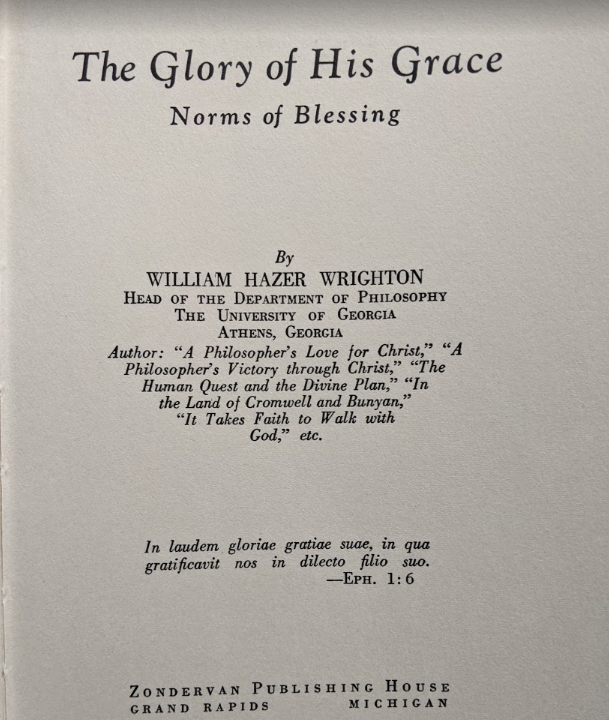I almost missed this, because I wasn’t reading very closely in what I considered a mere devotional book by a forgotten author. I admit I don’t expect to be smacked with new insights from devotional reading.

A few years ago I picked up a copy of William Hazer Wrighton’s book The Glory of His Grace: Norms of Blessing (Zondervan, 1940). It was in the library of a saintly old pastor, recently deceased, whose family had already culled the books they wanted to keep, and asked if I’d like to select a few from what remained. The pastor (himself author of numerous books) was a man of sturdy spirituality: biblically grounded, focused on God’s holiness and power, with a congenial Keswick flair. His library included lots of books I knew and loved already. So I grabbed a copy of Wrighton’s little book on Ephesians and eventually got around to reading it.
Here’s the big idea in Wrighton’s book: God works in our lives according to certain norms and standards, and those norms and standards are stated with special clarity in Ephesians. So under the sub-title “Norms of Blessing,” Wighton develops this idea in twelve chapters of devotional remarks on key passages in Ephesians. Here are the opening two paragraphs of his preface:
Norms do not imply limits to grace but rather that the measures of blessing are commensurate with the unfathomable fulness of the being and nature and will and power of God.
Kata, the Greek preposition for proportionate comparison, is used twenty-seven times in one form or another in the six brief chapters of Ephesians, Usually it is translated according to, sometimes even as, but here is the constant thought of a standard, a norm, a harmony of fountain and stream.
My first instinct on reading that kata (including its more elaborate form, kathos) occurs twenty-seven times in Ephesians was to think, “Well, of course it does, it’s an incredibly common way of communicating a basic relation between ideas: x according to y.” But then I ran over the first five or six occurrences that came to mind: “according to the good pleasure of his will,” “according to the riches of his grace,” “according to his pleasure, according to his purpose, according to the counsel of his will, according to the strength of his power,” and so on, including the careful statement that we were each given “grace according to the measure of the gift of Christ.”
That was it. Wrighton’s really put his finger on something here. In context, Ephesians does in fact have a pronounced tendency to make its point by setting spiritual effects under the headship of spiritual causes, and specifically under causes that exert powerful influence on the shape and proportion of the effects being considered. Over and over, Ephesians traces its message back into the mysterious depths of the divine character, especially into God’s attributes like wisdom, counsel, plan, and pleasure. The other major source to which Ephesians traces the blessings it enumerates is to the work of God in Christ: raising him up and enthroning him at the right hand of majesty. The exaltation of Christ as the fulfillment of God’s ways is what all spiritual blessing is “according to.”
The tendency of Ephesians to trace things back to a deep source that communicates its own form or proportion to the things it causes is a version of what scholastic theology would call “reduction to principle.” It explains why, even though Ephesians is a book about the almighty power of the triumphant divine warrior, it’s never about sheer power, raw power, or formless power. The power of God “at work towards us who believe” is always power according to, in the measure of, corresponding to, just as, normed and formed by, a great thing behind it.
So now, having long been a fan of the verbs and nouns of Ephesians, I have become a fan of the prepositions as well: at least of kata/kathos, which are a route into the infinite depths behind the gospel. Thanks goes to this little book by William Hazer Wrighton; he wrote several books, and his papers are held at Wheaton’s Archives, where you can read a brief biographical note about him. I see that his training was in philosophy. I’d like to read more of his work someday.